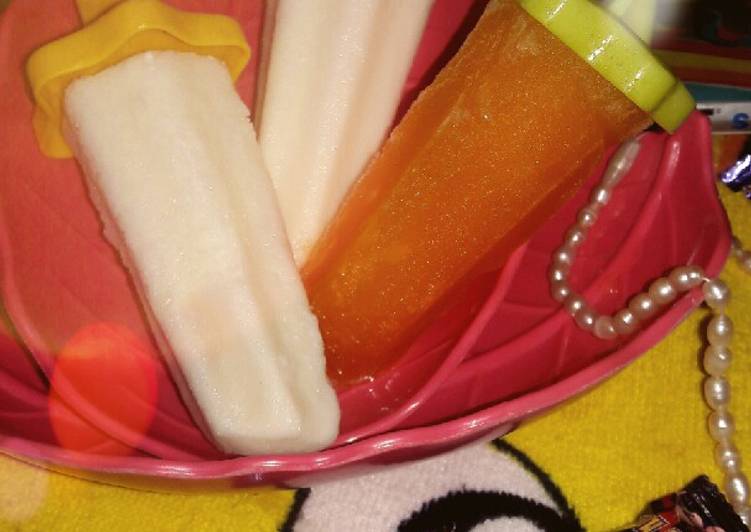Kulfi. Read Customer Reviews & Find Best Sellers. It is often described as "traditional Indian ice cream". It is popular throughout India, Sri Lanka, Pakistan, Bangladesh, Nepal, Burma (Myanmar), and the Middle East, and widely available in restaurants serving cuisines from the Indian subcontinent around the world.
 The milk can be replaced with mango pulp for mango kulfi. —Justine Kmiecik, Crestview, Florida This is a simple but delicious recipe for Kulfi (Indian Ice Cream) that I got from my sister-in-law.
I have made this several times, and it always gets rave reviews - even the kids love it!
For extra flavor, you could add a few drops of rose water or ground pistachios.
The end of the day extenuation often promote you over the edge and into a drive-thru window. But indeed, there are some really quick and easy recipes here to help you get a delectable and ideal meal on the table in no time.
The milk can be replaced with mango pulp for mango kulfi. —Justine Kmiecik, Crestview, Florida This is a simple but delicious recipe for Kulfi (Indian Ice Cream) that I got from my sister-in-law.
I have made this several times, and it always gets rave reviews - even the kids love it!
For extra flavor, you could add a few drops of rose water or ground pistachios.
The end of the day extenuation often promote you over the edge and into a drive-thru window. But indeed, there are some really quick and easy recipes here to help you get a delectable and ideal meal on the table in no time.
You can have Kulfi using 6 ingredients or deficient. Here is how you cook it.
Ingredients of Kulfi
- Prepare 2 cup of milk.
- You need 2 of cardamom.
- You need 4 tsp of sugar.
- You need 5 tsp of glucon-d orange.
- You need 5-6 pieces of Cashews.
- Provide 2 cup of water.
Kulfi is best described as Indian-style ice cream. However, unlike ice cream, kulfi is not churned. This is a fantastic summer dessert. This is a quick and easy version of kulfi with pistachios.
These recipes make in about 50 minutes from start up to finish, and 3 actions. Get ready to take these recipes to get you by way of a engaged back-to-school time!. Here guides how you mix 3 stepsit.
Kulfi guidance
- Boil the milk ; add sugar & cardamom.(can put different flavor).
- Fill it in kuifi pots..
- Freeze it for 45 minutes.
The instant kulfi does taste good but the traditional method of making malai kulfi is the best kulfi ever. Nuts of your choice like unsalted and raw almonds, cashew nuts or pistachios that are roughly chopped are also added which give a good nutty texture to the kulfi. There is another version where mawa or khoya is added for a rich flavor. This kulfi making process may seem very simple but it is actually complex on the molecular level. The light brown colour and unique flavour of Kulfi is a result of a series of chemical reactions that begins with the heating of milk.
Cooking is activity are often run by everyone, but not everyone has intelligence in making the maximum Kulfi, what are they?
Tips cook Kulfi to get results that are maximum
- Appointment the right food ingredients also affect the results of cooking, starting from determination fresh ingredients will be very good because the reserves of the nutrition is still very good.
- Equipment The cookware used must also match what is cooked. Also, care must be taken that the cleanliness of the cookware does not affect the taste and nutritional content.
- How to make Kulfi, which includes which ingredients must be processed first and which ones are processed later and when to add spices. This is done in order to produce processed which has nutritional quality and cooked food maturity without reducing the delicacy of the cuisine.
Create all people, cooking is indeed things which is quite simple. Besides they are indeed happy cooking and have ability cooking that is quite, they are also good in processing each dish so that it becomes food luscious. But there are those who cannot cook, so they must ask and see recipes that are simple to follow.
Already know the things you need to consider when cooking Kulfi? Try to use and choose the right food ingredients and follow the steps in cooking properly. good luck...!!!
The instant kulfi does taste good but the traditional method of making malai kulfi is the best kulfi ever. Nuts of your choice like unsalted and raw almonds, cashew nuts or pistachios that are roughly chopped are also added which give a good nutty texture to the kulfi. There is another version where mawa or khoya is added for a rich flavor. This kulfi making process may seem very simple but it is actually complex on the molecular level. The light brown colour and unique flavour of Kulfi is a result of a series of chemical reactions that begins with the heating of milk.